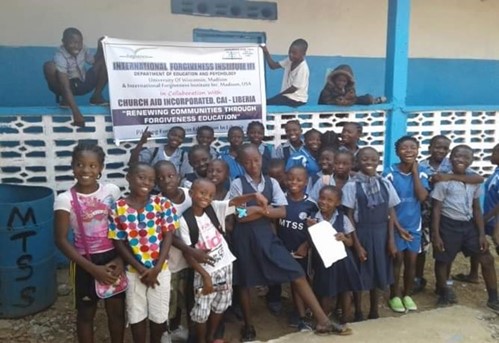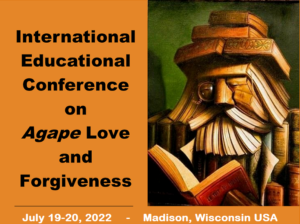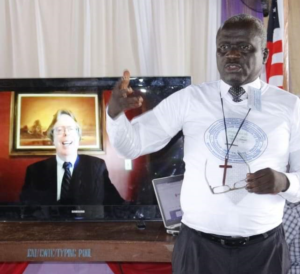Tagged: “family”
If we do not forgive situations, such as a tornado that was destructive, how can we aid children in feeling safe after something like this occurs? In other words, how then can we avoid post-traumatic feelings in the child?
You can work on two issues. The first is acceptance of what happened. This can take time, but it may help children learn that this is an imperfect world and so bad things do happen. The second is to work on what I call “the safe feeling,” which is a sense of being protected by parents and other loved ones. Of course, the “safe feeling” should not become an illusion that bad things will not happen. Working simultaneously on acceptance that bad things can happen, and that loved ones are here to assist, may help the child reduce any post-traumatic stress that has emerged.
Agape Love and Forgiveness Conference Speaker Videos Available in Four Languages
Speaker videos from the International Educational Conference on Agape Love and Forgiveness, held July 19-20, 2022, in Madison, Wisconsin, USA, (funded by the John Templeton Foundation) can now be viewed online absolutely free in four languages–Arabic, English, Hebrew, and Mandarin–using the links below.
The 26 professionally produced presentations feature educators from Northern Ireland, Israel (both Hebrew- and Arabic-speaking), Taiwan, the Philippines, and the US. They describe their experiences teaching agape love and forgiveness to their 5th grade students and outline creative Forgiveness Education teaching techniques.

Liberia Seeks Peace Through Forgiveness

Forgiveness Education class at Mother Tegeste Stewart Apostolic Pentecostal School in Brewerville, Monrovia, Liberia.
Bishop Brown has been working with IFI co-founder Dr. Robert Enright to implement elementary and secondary school Forgiveness Education initiatives (including for all 500 students at the Mother Tegeste Stewart Apostolic Pentecostal School in Brewerville), after-school forgiveness education clubs, and Sunday School forgiveness lessons. Since 2017, Group Forgiveness interventions also have been incorporated into the LFEP thanks to Bishop Brown’s significant role in governmental affairs.
“I suggested that approach, in all humility, because dialogue will not be fruitful if those engaging in the dialogue are still very angry about past grievances,” Dr. Enright explained. “Forgiveness is a scientifically-supported way of eliminating that anger.”
- Can Group Forgiveness In Liberia Lead to Peace?
- A New Strategy for Peace in the World. . . The Enright Forgiveness Inventory
- First Ebola, Now Coronavirus: Liberia Suffers Again
A Reflection on the International Educational Conference on Agape Love and Forgiveness, Madison, Wisconsin, July 19-20, 2022
Main Point 1: Despite cross-cultural differences, forgiveness has a common meaning across historical time and across cultures.
Main Point 2: To my knowledge, there never has been a conference on agape and forgiveness before this one.
Main Point 3: It is time for modern culture to reawaken the ancient moral virtues of agape and forgiveness for the good of individuals, families, and communities.
After over a year of detailed preparation by Jacqueline Song and the dedicated team, the agape love and forgiveness conference is now history. That history is preserved in the videos which have captured each talk presented at the conference (the videos are available here: Agape Love and Forgiveness Conference Videos).
I have at least three take-away points as I reflect on this conference:
- The cultural diversity was strong, with presentations by people from Israel, Northern Ireland, the Philippines, Taiwan, and the United States. Despite the wide cultural differences, one thing
 was clear: The meaning of both agape and forgiveness do not change as we get on an airplane and visit cultures that are far away from one another. Instead, the core meaning of agape remains in that as a person loves in this way, it is for the other person(s) and the expression of this love can be challenging for the one who willingly offers it. The core meaning of forgiveness remains as a person, unjustly treated by others, a) makes the free will decision to be good to those who acted unfairly, b) sees the inherent worth in those others, c) feels some compassion for them, d) willingly bears the pain on those others’ behalf, and e) offers goodness of some kind toward them. Yes, those who forgive may not reach all five of these characteristics, but they remain the goal, that to which we want to strive if excellence in forgiveness is our end point. Yes, there are important cultural nuances as one Islamic educator introduced forgiveness to the students with quotations from the Qu’ran and as an educator from a Christian school opened the New Testament to the students. The rich diversity had a glue that bound all together—-the objective reality of what these two moral virtues mean across historical time and across cultures. Objective meaning met cultural nuance at the conference.
was clear: The meaning of both agape and forgiveness do not change as we get on an airplane and visit cultures that are far away from one another. Instead, the core meaning of agape remains in that as a person loves in this way, it is for the other person(s) and the expression of this love can be challenging for the one who willingly offers it. The core meaning of forgiveness remains as a person, unjustly treated by others, a) makes the free will decision to be good to those who acted unfairly, b) sees the inherent worth in those others, c) feels some compassion for them, d) willingly bears the pain on those others’ behalf, and e) offers goodness of some kind toward them. Yes, those who forgive may not reach all five of these characteristics, but they remain the goal, that to which we want to strive if excellence in forgiveness is our end point. Yes, there are important cultural nuances as one Islamic educator introduced forgiveness to the students with quotations from the Qu’ran and as an educator from a Christian school opened the New Testament to the students. The rich diversity had a glue that bound all together—-the objective reality of what these two moral virtues mean across historical time and across cultures. Objective meaning met cultural nuance at the conference.
- Unless I missed something in my travels with forgiveness over the past 37 years, I do not think there ever was an international conference that focused specifically on the moral virtues of agape and forgiveness. If this is true, why is it the case? What has happened within humanity so that these two key moral virtues, so prominent for example in Medieval times, would be characteristically ignored in educational contexts with children and academic contexts in university settings? I think the transition from accepting objective truth about moral virtues (for example, justice is what it is no matter where we are in the world even when there are cultural nuances) has given way to an assumption that relativism is the new truth and so we all can choose the virtues we like and define them as we wish. Do you see the contradiction in such a statement? In the abandonment of objective reality that there is a truth, the new thinking is that relativism (in which there is no truth) is the new objective truth. It is time to reintroduce communities to the moral virtues, which we all share as part of our humanity. We need to know what these virtues are by definition and how we can give them away to others for their good, for our good, and for the good of communities.
- When I look across the globe at communities that have experienced conflict, that now carry the weight of the effects of decades and even centuries of conflict, I have come to the conclusion that a reawakening of the moral virtues of agape and forgiveness is vital if we are to heal from the effects of war and continued conflict with all of its mistrust and stereotyping of the human condition. Agape and forgiveness challenge us to see the personhood in everyone with whom we interact, even those who are cruel to us. This does not mean that we cave in to injustices because the moral virtue of justice requires fairness from all. The healing of hearts, families, communities, and nations will be better accomplished if people now can shake off the dust from agape and forgiveness, that have been so ignored in modernism, and find a new way with the old virtues. It seems to me that agape and forgiveness, as a team, is a powerful combination for the healing of trauma for individuals and relationships. I fear a continuation of the same old conflicts in hearts and in interactions if we do not go back and rediscover the life-giving virtues of agape love and forgiveness and bring them forward now in schools, families, houses of worship, and workplaces.
Robert
I seem to be lost on the forgiveness path. I try and try, but I do not think I have made much progress in forgiving my partner and this has been going on for about a year. Should I just get off the forgiveness path regarding my forgiving him?
Before you give up, I have some questions for you:
1) Have you committed to doing no harm to your partner, even in the context of your having the opportunity to somehow hurt him? If you answered, “Yes, I have committed to doing no harm,” then you are not lost on the forgiveness journey. This is a big step in the process;
2) Have you tried to see his weaknesses, his confusions, his wounds that may have wounded you? If not, perhaps you need to do some of this cognitive work, to see him in a wider perspective than only his injuries toward you;
3) Do you think that your will is strong enough to do the work outlined in #1 and 2 above? If so, that work could lead to your forgiving if you give this time.
So, what do you think? Have you found your way back onto the path of forgiveness?








